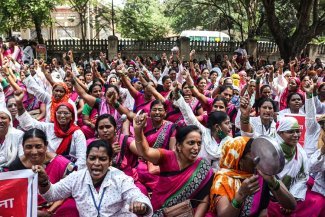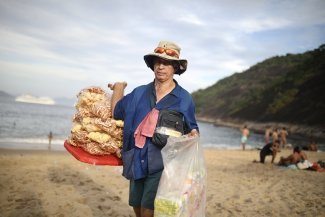Salah Abbas was killed by police during the 2012 Formula One Grand Prix in Bahrain. His body was discovered the day before the main race on a rooftop in the village of Shakhoura.
Salah had been protesting the staging of the race when he was arrested. His body was found with multiple large bruises and numerous shotgun pellet wounds. His ribs were broken and dried blood covered his head and body.
The police officer responsible for his murder was acquitted last year.
On the day of Salah’s funeral, thousands of protesters poured onto the streets shouting anti-regime and anti-Formula One slogans. Journalists covering the protests were arrested, detained and deported from Bahrain.
Two days following the death of Salah, the UK’s Channel 4 news team was detained and deported from the country.
Sports and human rights had unified into a single cause for protest as the result of the brutal killing of Salah; the reputation of Formula One and motorsport in general was in tatters.
A year later, the race was back on despite the ever-deteriorating human rights situation. Formula One chief Bernie Ecclestone assured media that it was safe for the race to take place in the country.
The Bahraini government racked up its public relations campaign to win over hesitant sponsors.
To counter the mass protests witnessed in the previous year, the Bahrain government set up countrywide checkpoints, deployed security forces at the entrances of certain villages and went so far as to border other villages with barbed wire to prevent protesters from leaving.
The abuses started well before the actual race with human rights defenders documenting over 300 arrests—including 200 children—and 135 home raids.
More than 50 allegations of torture were received during the month of the race alone.
Rihanna al-Mousawi was one such victim, arrested at the Formula One track after an attempt to stage a protest. Rihanna appeared in court two months later after being stripped naked twice during detention, forced to stand naked whilst security personnel watched and threatened with rape.
Rihanna was then subjected to torture and later sentenced to five years imprisonment on charges related to terrorism.
Catalyst for more violations
The next Formula One race in Bahrain kicks off this weekend.
But it continues to be a catalyst for increasing human rights violations in the country.
Government officials have used it to promote a fictitious image of a country where all political and human rights problems are resolved and everything is ‘business as usual’.
This couldn’t be further from the truth.
The Bahraini government has cracked down on any hint of protest activity to safeguard its public image internationally.
In March 2014, Americans for Democracy and Human Rights in Bahrain filed a complaint to the Organisation for Economic Co-operation and Development (OECD) against Formula One management.
It claimed Formula One had breached OECD guidelines by disregarding its responsibility to “avoid causing or contributing to adverse human rights impacts and address such impacts when they occur.”
In addressing the situation directly with the President of the Federation Internationale de l’Automobile, the governing body of motorsport worldwide, six Bahraini human rights organisations addressed a letter to Jean Todt asking for the suspension of the race until an Ethics Committee inquiry investigated the decision to hold the race.
In his response, Todt disassociated himself with the decision to register Formula One in Bahrain in 2004.
He later took responsibility for the decisions to retain the 2012 and 2013 races as well as the decision to register the 2014 race, yet argued that “sport should not be held hostage to any form of political combat” and that the FIA Ethics Committee “has no legitimate right to become embroiled in the internal affairs of any sovereign state.”
Todt failed to address the central point of the NGO complaint: that Formula One has significantly contributed to severe human rights violations Bahrain – and continues to do so.
The argument against the Formula One is therefore not one of meddling in the internal affairs of Bahrain.
It is the fact that Formula One cannot distance itself from the internal human rights situation because it is causing violations.
The people will always use the extra media attention during the event to voice their demands for democracy, human rights and socio-economic justice, the government will use it for political gains, and the police will indiscriminately crackdown on any form of civil disobedience that they predict will occur.
In effect, the country is transformed into an improvised state of martial law as security forces work to contain the Formula One in a tightly controlled bubble.
Sports boycotts
There are many precedents for sports boycotts. It was Formula One who decided to pull out from South Africa in protest against the apartheid regime.
More recently, UK government ministers boycotted the Euro 2012 football championship in Ukraine to protest against the jailing of opposition leader Yulia Tymoshenko, and several Western states boycotted the 2014 Sochi Paralympics to protest Russia’s intervention in Crimea.
When it comes to Bahrain, these principles, including the FIA Code of Ethics, do not apply.
In November 2013, a UK Foreign Affairs Committee criticised the UK government, arguing that there has been no “consistency of logic” to the UK approach in boycotting Euro 2012 yet refusing to boycott the Bahrain Grand Prix in the same year.
UK Prime Minister David Cameron even went a step further in publicly supporting the 2012 race when he stated: “Bahrain is not Syria”.
In 2013, trade unions representing 3.6 million workers in the UK, and 20 MPs sent a letter to the Prime Minister calling upon his government to support the cancellation of the race.
This year, 29 MPs representing seven different political parties have signed an Early Day Motion that opposes the staging of the 2014 Bahrain Grand Prix.
Up until now, the response by the UK government has been concerning. Only last week, Baroness Sayeeda Warsi, Senior Minister of State at the Foreign & Commonwealth Office (FCO), argued that: “the UK has not received any specific evidence of the use of torture to extract confessions [in Bahrain].”
This is, of course, a big misrepresentation given the large amounts of evidence provided to the FCO since 2011.
Moreover, the existence of the Bahrain Independent Commission of Inquiry (BICI) report, which proved that Bahrain is systematically torturing individuals for confessions, is one of the central documents used by the FCO to claim Bahrain is on a path of reform.
It is difficult to believe that the UK would defend such a report without reading its contents regarding systematic torture.
It is also extremely difficult to defend Bahrain’s torture record when the country has cancelled two proposed visits by the UN special rapporteur on torture without setting a third date.
Bahrain’s human rights record has not improved since the uprising began in 2011, and accountability remains a central catalyst preventing any form of change.
The country operates within a system of impunity; not one police officer has been convicted for the murder of protesters since 2011.
In turn, protesters have been sentenced for up to life imprisonment for crimes relating to freedom of expression, while those responsible for torture are acquitted.
Prominent human rights defenders such as Abdulhadi Al-Khawaja and Nabeel Rajab remain in jail.
Has Formula One tied itself to Bahrain’s politics? Yes, and as Maryam Al-Khawaja—the Acting President of the Bahrain Centre for Human Rights—has argued: “The Formula one race should be cancelled because in Bahrain it can be a matter of life and death. Just ask Salah Abbas.”









